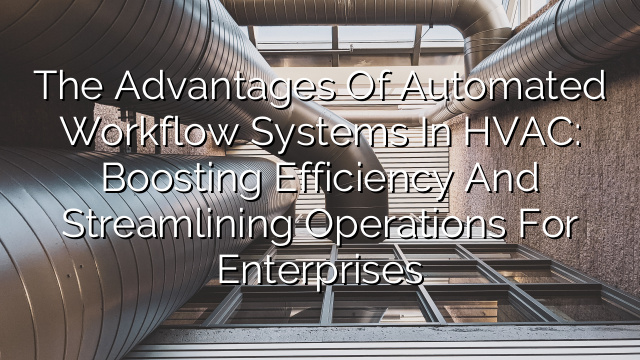Introduction
Enterprise HVAC enterprises are facing new challenges and opportunities with the advent of the Internet of Things (IoT). The HVAC industry is rapidly adopting IoT technology to improve technology integration and automation. In this blog post, we will explore the impact of IoT on enterprise HVAC enterprises and how it is revolutionizing the industry.
The Internet of Things (IoT) and HVAC
The Internet of Things (IoT) refers to a network of interconnected devices and sensors that collect and exchange data. In the HVAC industry, IoT technology enables the integration of various HVAC systems and components, allowing for more efficient and automated operation.
IoT-enabled HVAC systems can gather data on temperature, humidity, air quality, and energy consumption in real time. This data can be analyzed to identify patterns and optimize the performance of HVAC systems. For example, an IoT-enabled HVAC system can automatically adjust temperature and airflow based on occupancy and environmental conditions, resulting in energy savings and improved comfort.
Benefits of IoT in Enterprise HVAC Enterprises
The adoption of IoT technology in enterprise HVAC enterprises offers several benefits:
Energy Efficiency: IoT-enabled HVAC systems can optimize energy consumption by adjusting settings based on real-time data. This leads to significant energy savings for enterprises, reducing operational costs and environmental impact.
Remote Monitoring and Control: IoT technology allows facility managers to remotely monitor and control HVAC systems. This provides real-time visibility into system performance and the ability to make adjustments or address issues without being physically present.
Predictive Maintenance: IoT-enabled HVAC systems can monitor equipment performance and detect potential issues before they result in a breakdown. This allows for proactive maintenance, reducing downtime and extending the lifespan of equipment.
Improved Comfort: IoT technology enables more precise control over HVAC systems, resulting in improved comfort for building occupants. Temperature, humidity, and airflow can be adjusted in real time to meet individual preferences and maintain optimal conditions.
Data Analytics: The data collected by IoT-enabled HVAC systems can be analyzed to gain insights into system performance, energy consumption, and occupant behavior. This information can inform decision-making and drive continuous improvement.
Challenges and Considerations
While IoT technology offers numerous benefits, there are also challenges and considerations to keep in mind:
Data Security: With the increased connectivity of IoT devices, there is a greater risk of data breaches and cyberattacks. Enterprise HVAC enterprises must implement robust security measures to protect sensitive data and ensure the integrity of their systems.
Compatibility and Integration: Integrating IoT technology with existing HVAC systems and infrastructure can be complex. Compatibility issues may arise, requiring careful planning and coordination to ensure seamless integration.
Scalability: As enterprise HVAC enterprises expand, their IoT systems need to scale accordingly. Planning for scalability from the outset is essential to avoid limitations and potential disruptions as the business grows.
Training and Support: Familiarity with IoT technology and its operation is vital for facility managers and technicians. Adequate training and ongoing support are necessary to maximize the benefits of IoT in enterprise HVAC enterprises.
Automation and Future Possibilities
Automation is a key aspect of IoT-enabled HVAC systems. By leveraging IoT technology, enterprise HVAC enterprises can automate various processes, reducing manual intervention and improving operational efficiency.
For example, HVAC systems can be programmed to adjust settings based on occupancy schedules, automatically turn on or off based on occupancy or environmental conditions, and send alerts or notifications in case of equipment malfunctions. These automated processes streamline operations, reduce energy waste, and enhance overall system performance.
In the future, the integration of IoT technology with artificial intelligence (AI) and machine learning (ML) holds even greater potential. AI and ML algorithms can analyze data collected by IoT devices to identify trends, predict maintenance needs, and optimize HVAC system performance.
Conclusion
The Internet of Things (IoT) is transforming the enterprise HVAC industry by enabling improved technology integration and automation. IoT-enabled HVAC systems offer benefits such as energy efficiency, remote monitoring and control, predictive maintenance, improved comfort, and data analytics. However, enterprise HVAC enterprises must also address challenges related to data security, compatibility, scalability, and training to fully leverage the potential of IoT.
By embracing IoT technology and automation, enterprise HVAC enterprises can unlock new levels of efficiency, cost savings, and customer satisfaction. As the industry continues to evolve, it is crucial to stay updated with the latest advancements and leverage technology to stay ahead.
FAQs
How does IoT improve energy efficiency in HVAC systems?
IoT-enabled HVAC systems can optimize energy consumption by adjusting settings based on real-time data. This leads to significant energy savings for enterprises, reducing operational costs and environmental impact.
What are the benefits of remote monitoring and control in enterprise HVAC enterprises?
Remote monitoring and control allow facility managers to have real-time visibility into HVAC system performance and make adjustments or address issues without being physically present. This improves operational efficiency and reduces downtime.
How can IoT technology help with predictive maintenance?
IoT-enabled HVAC systems can monitor equipment performance and detect potential issues before they result in a breakdown. This allows for proactive maintenance, reducing downtime and extending the lifespan of equipment.
How does IoT improve comfort in buildings?
IoT technology enables more precise control over HVAC systems, resulting in improved comfort for building occupants. Temperature, humidity, and airflow can be adjusted in real time to meet individual preferences and maintain optimal conditions.
How can data analytics benefit enterprise HVAC enterprises?
The data collected by IoT-enabled HVAC systems can be analyzed to gain insights into system performance, energy consumption, and occupant behavior. This information can inform decision-making and drive continuous improvement.






